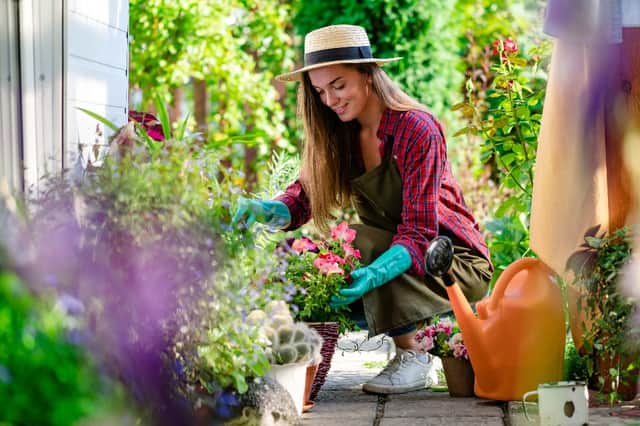Ten simple ways gardeners can help the environment
This article contains affiliate links. We may earn a small commission on items purchased through this article, but that does not affect our editorial judgement.


Gardeners can help to deal with the climate crisis
It was one of the linchpins of the fight on the home front during the Second World War.
Set up by the Ministry of Agriculture, the iconic Dig for Victory campaign encouraged men and women across Britain to grow their own food amid a climate of harsh rationing.
Advertisement
Hide AdAdvertisement
Hide AdInvoking the same energy, now the Royal Horticultural Society (RHS) wants to harness the power of millions of gardeners in today’s battle against the climate and biodiversity crisis.
The charity’s Planet-Friendly Gardening Campaign, which is part of its ambitious sustainability strategy, is more than a rallying cry to help protect the planet
At the root of the national campaign is the recognition that small actions lead to big results when it comes to what people choose to plant, buy and consume.
RHS scientific research shows that if every one of the UK’s 30 million gardeners planted a medium sized tree and nurtured it to maturity, they would store the carbon equivalent of driving 11 million times around the planet.
And if each person made an average of 190kg of compost a year, this would save the carbon equivalent to heating 506,000 average sized houses for 12 months.
Together the nation's gardeners can make a difference
“Collectively, the actions of each and every one of our nation’s 30 million gardeners can create positive change and help us adapt to and mitigate against the climate crisis and help to reverse the biodiversity crisis,” said Professor Alistair Griffiths, RHS director of science and collections.
“We are not underestimating the mountain of things we all have to do to change our behaviours individually, but we are calling on government, industry, influencers, communities and individuals to recognise that gardening and growing plants more sustainably can play a major role - and it is something we can all do, either on a window sill, in our own gardens or with a community gardening group.”


As part of the campaign, the RHS has drawn up a list of achievable actions for gardeners.These could be planting a tree; going peat-free; making your own compost; or simply eating more homegrown, UK, local and seasonal fruit and vegetables.
Advertisement
Hide AdAdvertisement
Hide AdOther measures include pulling up a paving slab and growing perennial plants to maturity; and helping map UK garden plant biodiversity.
Gardeners can ‘water the way nature intended’ and pledge to switch from mains water to rainwater.So far the RHS Mains2Rains campaign has received pledges to potentially save at least 6.6 million litres of mains water - equivalent to 82,385 baths.
According to research conducted earlier this year, just 19 per cent of UK gardeners say they have specifically adopted sustainable gardening principles such as conserving water, making their own compost and reducing fossil fuel usage.
However, the RHS says the transition to peat-free gardening shows people are willing to change their habits.
Almost a quarter of gardeners who currently don’t make compost say they would consider doing so if the council provided free or subsidized compost bins and a manual.
The RHS believes that knowledge is key to bringing about change.
And the charity hopes a new ‘Planet-Friendly sustainability calculator’ will empower people to make the best sustainable plant and gardening choices.
This online tool - the first of its type - is being developed through five years of RHS-funded research into the carbon and water dynamics of the domestic garden.
Advertisement
Hide AdAdvertisement
Hide AdThe RHS will be sharing its Planet Friendly Gardening actions along with gardening advice through its membership, online, with films, social media, at its RHS shows and across its channels that reach millions of people.
And the charity is setting stretching sustainability targets for its own operations.
It aims to be climate positive by 2030 - capturing and reducing more greenhouse gas emissions than it emits.
Other targets to achieve by 2030 are to eliminate all single use plastic and ensure that all packaging is 100 per cent reusable, recyclable, or compostable in all RHS work; and to be water neutral - capturing, reusing and recycling water in RHS gardens, shows and sites.
“We have already achieved a lot but we know that we can work harder to make our shows and gardens even greener and we are committed to achieving this by 2030,” said Sue Biggs, RHS director general.
“We hope that we can work alongside and learn from others and share what we learn as we move towards becoming Net Positive for Nature and People.”
To find out more visit: https://www.rhs.org.uk/about-the-rhs/sustainability
The RHS’s achievable actions for gardeners:
1 Plant a tree in your community, school, workplace or garden to draw carbon out of the air.
Advertisement
Hide AdAdvertisement
Hide AdGrown to maturity, a small tree stores up to 376kg of carbon; a medium tree, 511kg; and a large tree, 3,350kg.
2 Water the way nature intended.
Pledge to switch from mains to rains on RHS mains2rains https://mains2rains.uk
3 Go peat-free.
Protecting precious peatland habitats which are the largest land carbon store and havens for biodiversity will also help reduce flood risks.
4 Make your own compost.
Every 1kg of homemade compost saves 0.1kg fossil carbon, which could save more than 19kg carbon, per gardener, every year.
5 Pull up a paving slab (1m²) and grow perennial plants to maturity.
Herbaceous perennials (lawn grasses and non-woody plants) draw 3.21kg carbon/m² out of the air; shrubs, 19.54kg; and trees, 40.38kg.
6 Plants for pollinators.
Help slow and reverse declines in bees, butterflies, moths, hoverflies and other pollinators by growing a wide variety of plants including a mixture of native, near-native and exotic plants to support pollinator biodiversity.
7 Grow your own bunch of flowers.
Growing or buying UK-grown cut flowers can save up to 7.9kg carbon per bunch compared with buying imported bunches.
8 Electrify your garden.
Advertisement
Hide AdAdvertisement
Hide AdEven though 82 per cent of garden tools sold in the UK are powered by electricity, according to one report nearly 40 per cent of gardeners still use ones powered by fossil fuels. An average gardener uses nine litres of petrol a year.
9 Help map UK garden plant biodiversity.
Add your garden plants to RHS My Garden online to help the RHS conserve this important biodiversity for future generations.
10 Eat more homegrown, UK, local and seasonal fruit and vegetables.